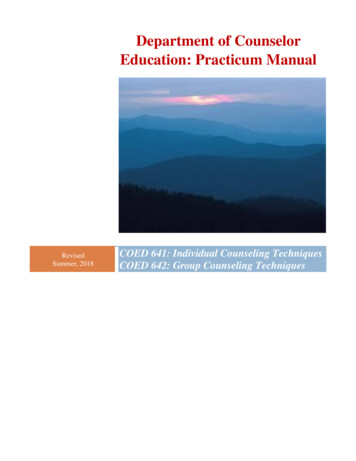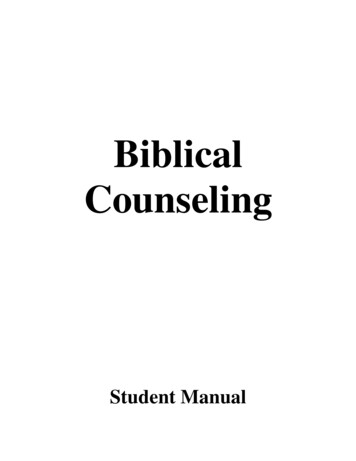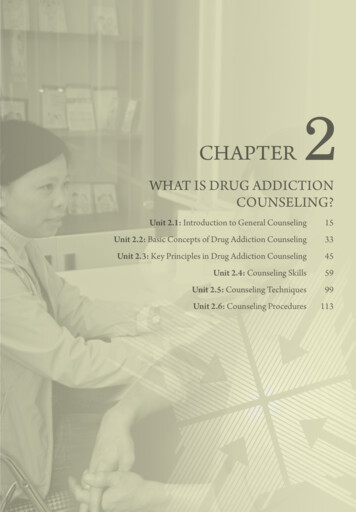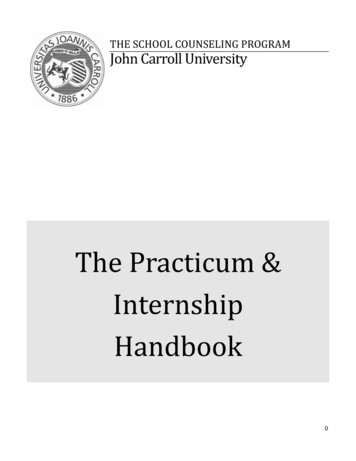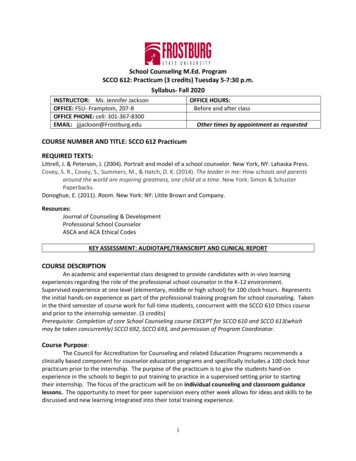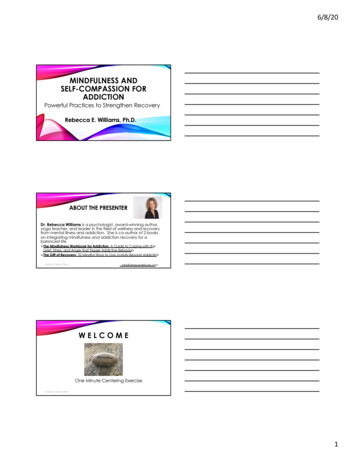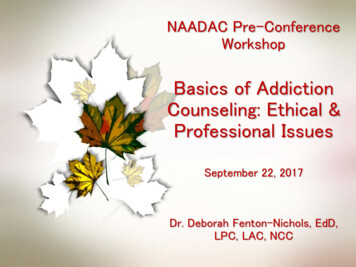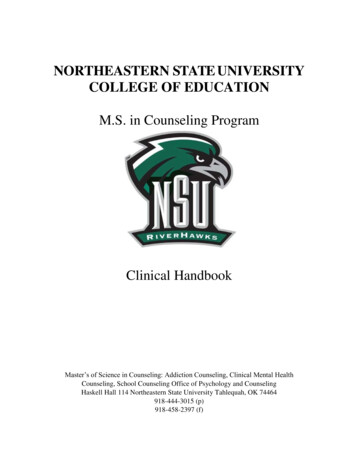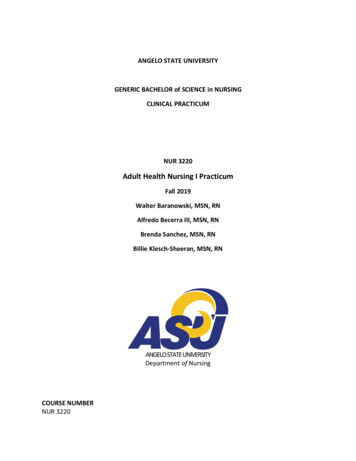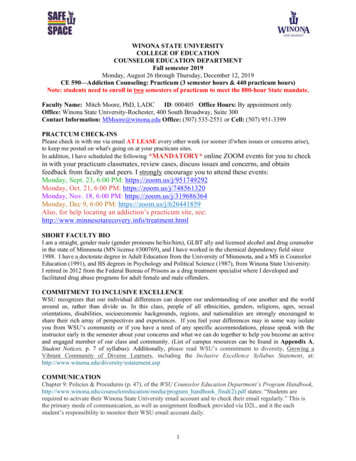
Transcription
WINONA STATE UNIVERSITYCOLLEGE OF EDUCATIONCOUNSELOR EDUCATION DEPARTMENTFall semester 2019Monday, August 26 through Thursday, December 12, 2019CE 590—Addiction Counseling: Practicum (3 semester hours & 440 practicum hours)Note: students need to enroll in two semesters of practicum to meet the 880-hour State mandate.Faculty Name: Mitch Moore, PhD, LADC ID: 000405 Office Hours: By appointment onlyOffice: Winona State University-Rochester, 400 South Broadway, Suite 300Contact Information: MMoore@winona.edu Office: (507) 535-2551 or Cell: (507) 951-3399PRACTCUM CHECK-INSPlease check in with me via email AT LEASE every other week (or sooner if/when issues or concerns arise),to keep me posted on what's going on at your practicum sites.In addition, I have scheduled the following *MANDATORY* online ZOOM events for you to checkin with your practicum classmates, review cases, discuss issues and concerns, and obtainfeedback from faculty and peers. I strongly encourage you to attend these events:Monday, Sept. 23, 6:00 PM: https://zoom.us/j/951749292Monday, Oct. 21, 6:00 PM: https://zoom.us/j/748561320Monday, Nov. 18, 6:00 PM: https://zoom.us/j/319686364Monday, Dec 9, 6:00 PM: https://zoom.us/j/626441859Also, for help locating an addiction’s practicum site, mlSHORT FACULTY BIOI am a straight, gender male (gender pronouns he/his/him), GLBT ally and licensed alcohol and drug counselorin the state of Minnesota (MN license #300769), and I have worked in the chemical dependency field since1988. I have a doctorate degree in Adult Education from the University of Minnesota, and a MS in CounselorEducation (1991), and BS degrees in Psychology and Political Science (1987), from Winona State University.I retired in 2012 from the Federal Bureau of Prisons as a drug treatment specialist where I developed andfacilitated drug abuse programs for adult female and male offenders.COMMITMENT TO INCLUSIVE EXCELLENCEWSU recognizes that our individual differences can deepen our understanding of one another and the worldaround us, rather than divide us. In this class, people of all ethnicities, genders, religions, ages, sexualorientations, disabilities, socioeconomic backgrounds, regions, and nationalities are strongly encouraged toshare their rich array of perspectives and experiences. If you feel your differences may in some way isolateyou from WSU’s community or if you have a need of any specific accommodations, please speak with theinstructor early in the semester about your concerns and what we can do together to help you become an activeand engaged member of our class and community. (List of campus resources can be found in Appendix A,Student Notices, p. 7 of syllabus). Additionally, please read WSU’s commitment to diversity, Growing aVibrant Community of Diverse Learners, including the Inclusive Excellence Syllabus Statement, OMMUNICATIONChapter 9: Policies & Procedures (p. 47), of the WSU Counselor Education Department’s Program media/program handbook final(2).pdf states: “Students arerequired to activate their Winona State University email account and to check their email regularly.” This isthe primary mode of communication, as well as assignment feedback provided via D2L, and it the eachstudent’s responsibility to monitor their WSU email account daily.1
REQUIRED TEXT Baird, B. N. (2014). The Internship, Practicum, & Field Placement Handbook: A Guide for theHelping Professions, 7th Ed. New York: Pearson. ISBN-13: 978-0-205-95965-5SUGGESTED TEXT/READINGS Perkinson, R. R. (2012). Chemical Dependency Counseling: A Practical Guide, 4th Ed. Thousand Oaks,CA: Sage Publications, Inc. ISBN-13: 978-1-4129-7921-4This comprehensive text is highly recommended and is an exceptional resource for all of the ACCP coursesand in your career as an LADC! Addiction Counseling Competencies: The Knowledge, Skills & Attitudes of Professional Practice.Technical Assistance Publication (TAP) Series /TAP21.pdf 1 2011.pdf Confidentiality of Patient Records for Alcohol and Other Drug Treatment. Technical AssistancePublication (TAP) Series 13: http://kap.samhsa.gov/products/manuals/taps/13.htm Checklist for Monitoring Alcohol and Other Drug Confidentiality Compliance. TechnicalAssistance Publication (TAP) Series 18: SUGGESTED READINGS/RESOURCES Schwartz, B. M., Landrum, R. E., & Gurung, R. A. (2014). An Easy Guide to APA Style, 2nd ed.Washington, DC: Sage Publishing. ISBN: 978-1-4522-6839-2 American Counseling Association (ACA). 92014). ACA Code of -of-ethics.pdf Minnesota Certification Board (IC&RC) Code of Ethical duct/mcb/code-of-ethical-conduct NAADAC Code of Ethics https://www.myaccucare.com/ common/pdf/2011 naadac code of ethics Standard of Ethics for the Minnesota Association of Resources for Recovery and Chemical Health(MARRCH): http://www.marrch.org/displaycommon.cfm?an 1&subarticlenbr 1 Substance Abuse Confidentiality Regulations: 42 CFR Part 2http://www.samhsa.gov/about/laws/SAMHSA 42CFRPART2FAQII Revised.pdf Title 42, SUBCHAPTER A, PART 2—CONFIDENTIALITY OF ALCOHOL AND DRUG ABUSEPATIENT s.action?browsePath Title 42%2FChapter%2FSubchapter A%2FPart 2&granuleId CFR-1997-title42-vol1-part2&packageId CFR-1997-title42vol1&collapse true&fromBrowse true&bread true l1/pdf/CFR-1997-title42-vol1-part2.pdf Understanding Health Information Privacy—Summary HIPPA Privacy & Security nding/summary/privacysummary.pdf ng/srsummary.html THE CONFIDENTIALITY OF ALCOHOL AND DRUG ABUSE PATIENT RECORDS REGULATIONAND THE HIPAA PRIVACY RULE: IMPLICATIONS FOR ALCOHOL AND SUBSTANCE ocs/SAMHSAPart2-HIPAAComparison2004.pdf Applying the Substance Abuse Confidentiality Regulations to Health Information Exchange FAQs.pdf Minnesota Board of Behavioral Health & Therapy (BBHT) LADC t.aspx Wisconsin Substance Abuse Counselor Certification ce-Abuse-Counselor-Certification-Information2
WISCONSIN STATUTES AND ADMINISTRATIVE CODE RELATING TO THE PRACTICE OFSUBSTANCE ABUSE E SPECIFICSClass Meeting Dates: Class meets an arranged basisCatalog Description: This course provides a practical, field-based experience of 880 hours in an addictioncounseling setting as required by the Minnesota Board of Behavioral Health and Therapy (MBBHT) LicensedAlcohol and Drug Counselor [LADC], and the Minnesota Certification Board’s (MCB) Board CertifiedCounselor (BCC) requirements (IC&RC). This experience may be arranged with supervision coordinatedthrough the practicum course instructor and an on-site supervisor. A total of six (6) credits—two sections—ofpracticum work must be completed.Prerequisite: All Addiction Counseling Certificate required courses (CE550, 555, 560, 565, 570, and 575)must be taken prior to enrollment in CE 590-Addiction Counseling: Practicum.Alignment with CACREP Standards: CED 590-Addiction Counseling: Practicum satisfies all requirementsfor the supervised practicum experience outlined in Section III – Clinical Instruction (Section III: A, B, C, D,E, F, H, I, J, K, L, and M) of the 2001 CACREP Standards).PURPOSE & OBJECTIVESPurpose: The faculty of the Counselor Education Department regards the practicum as an integral componentof its counseling programs. Academic and applied counseling skills are synthesized and used by approvedinterns on a daily basis in an addiction counseling setting. Practicum is a vital educational component forfuture LADCs to learn and practice the 12 Core Functions and 8 Practice Dimensions of an addictioncounselor in a supervised clinical setting. Regular and ongoing supervision (group and/or individual) isprovided by a qualified and approved on-site supervisor in cooperation with the assigned university courseinstructor/practicum supervisor. Only those students who successfully complete CE 590-AddictionCounseling: Practicum (earning a final grade of B or better) will be recommended for endorsement by theCounselor Education Department.The principal objective of the practicum is to provide an opportunity for integration of knowledge and skills ina relevant setting. Applying theory and counseling skills under competent supervision enables students tomake the necessary transition from the certificate program to the actual world of work. When the transition ismade with adequate supervision, students gain competence and confidence in the delivery of counselingservices. The reality of the practicum setting provides the necessary bridge between training and professionalcompetence.In addition to preparing students for transition into the world of work, the program is beneficial to the involvedagency or educational setting. Students bring to the staff an enthusiasm and willingness to learn as well asintegrated counseling knowledge and skills. It is expected that Addiction Counseling Certificate Programstudents will have supervised responsibilities similar to regular staff members, thereby contributingsubstantially to the functioning of the particular counseling setting.The basic assumption underlying all practicum arrangements is that the primary focus of each setting is thewelfare of its clients. The Winona State University Counselor Education Department requires that all internactivities be conducted within the context of responsibility for client welfare and the ACA Ethical guidelinesfor professional counseling practice.3
Counselor Education Department faculty cooperates in the practicum with agencies and educationalinstitutions in the community. The faculty is committed to an ongoing evaluation for improving the practicumexperience for counselor-trainees and the participating practicum sites.Required Forms and Permanent Practicum File Folder: All students enrolled in CE 590-AddictionCounseling: Practicum will be provided with required practicum forms (see syllabus Appendix B for requiredand suggested forms and additional resources). At the conclusion of the practicum experience students arerequired to provide the course instructor with a completed practicum file folder that included all mandatorydocumentation, to include: proof of professional liability insurance, Internship/Practicum Agreement, MidTerm Evaluation Form—to be completed after first section of Practicum (approximately 440 hours), and FinalReports and Practicum Site Supervisor Evaluation of Student—to be completed at the end of practicum (aftercompleting 880-hours). Other optional forms may include: Internship/Practicum Course Instructor Evaluationof Student, Student Evaluation of Internship/Practicum Field Experience, Practicum Goals and Objectives,etc.—see Appendix B, Student Forms & Clinical Resources, p. 8 of syllabus). Practicum file folders will bemaintained by the Counselor Education Department as part of the student’s permanent record.Objectives:1.Build addiction counseling skills (i.e., the 12 Core Functions and 8 Practice Dimensions of anaddiction counselor) in a supervised clinical setting leading to independent practice.2.Gain an integrated and comprehensive applied understanding of the role and function of counselors inan addiction counseling setting.3.Become well informed about referral agencies and other community resources and be able to referclients when appropriate.4.Develop a well-informed understanding of legal, ethical, and professional issues confrontingprofessional addiction counselors employed in either a community or school counseling setting.5.Become aware of issues and intervention strategies specific to diverse populations of clients (e.g.culturally diverse people, people with disabilities, older adults, children, people who are gay orlesbian, etc.).6.Build and demonstrate well-developed record keeping and report writing skills.7.Develop a self-awareness of abilities, behaviors, values, and attitudes and how they impact onperformance in addiction counseling.8.Develop and demonstrate a thorough understanding of case management strategies and techniquesinvolved in the practice of addiction counseling either in a community or school counseling setting.9.Develop and demonstrate skills in the selection and administration of a variety of assessmentinstruments.10.Demonstrate a well-developed ability to give and receive feedback in a respectful, growth oriented,and professional manner.Basic Instruction Plan:1. Periodic group and/or individual supervision with course instructor to discuss cases, on-sitesupervision experiences, ethical or legal considerations, skill development and utilization, etc.2. Supervised field experience with regular and on-going supervision (at least one hour per week by anapproved and qualified field site supervisor).3. On-site and/or phone contact between course instructor, the student, and the field site supervisor on anas needed basis for set-up, review, and evaluation of student performanceStudent: The Counselor Education Department requires that each student document at least 880 clock hours ofpracticum related experience (as per Minnesota LADC requirements). The number of practicum hours eachsemester is agreed upon by the student, the course instructor, and the site supervisor. The hours are based onstudent needs and competencies, and upon the needs and desires of the setting involved. The total 880-hourpracticum is normally completed over a two-semester sequence and may involve more than one practicum site.Practicum students (interns) are responsible for following guidelines that are similar to those followed byaddiction counseling agency staff. While expectations of staff and interns vary from setting to setting, students4
and supervisors should be aware of some general guidelines that can promote the most beneficial experiencefor all involved.Prior to beginning the practicum, students will have completed a basic core of addiction counseling courses.After consultation with the practicum course instructor or a faculty advisor, students select an practicum siteappropriate to their skills, knowledge, and specific area of interest. The CE practicum course instructor willassist students in establishing a contract with the site of choice. Upon mutual agreement by the student,agency or clinic, and the practicum course instructor, interns then follow the procedures listed below (also, seeAppendix B, p. 8 of syllabus).1) Proof of Professional Liability Insure – Prior to beginning any practicum related activities allstudents must purchase and provide proof of professional liability insurance to the Practicumcourse instructor. Proof of professional liability insurance will be kept on file in the student’spermanent practicum file folder in the Counselor Education Department.2) Practicum Agreement and Site Approval – If requested by the agency or clinic, interns providetheir prospective site supervisor with a LADC Practicum Site Approval Form (see p. 14), whichthe site supervisor will complete and the student will return to me.3) A LADC Practicum Agreement Form (see pp. 15-16) must be completed at the onset ofpracticum, which we will sign at our introductory site visit (with approximately two weeks ofyour site approval). The agreement describes the objectives, duties, and responsibilities of thepracticum experience with copies distributed to the practicum on-site supervisor, the intern, andthe practicum course instructor. On-site supervisors who hold a graduate degree in an appropriatearea and who have a minimum of at least two (2) years of experience with the population andissues the intern will encounter are designated to provide supervision to the intern.4) Supervision - Interns participate in a minimum of one and one half (1 1/2) hours per week ofindividual and/or group supervision. Periodic supervision will be provided by the courseinstructor in either a group or individual format as student requires/requests needed. This mayinclude period site visits and observations, discussions (phone, email, in-person) with sitesupervisor and/or student, and progress updates.5) Practicum Final Report - Interns maintain a running record (a weekly log) of all practicumrelated activities and total hours completed. A copy of the completed forms will be kept in thestudent’s permanent practicum file that is kept in the Counselor Education Department.6) Midterm and Final Practicum Summaries - Interns prepare a midterm (after the first section ofCE 590, about 440-hours) and final practicum summary (nearing completion of the secondsection, at about 880 hours) integrating their practicum experiences with their current and ongoingprofessional goals. This will be discussed during supervision with the university and sitesupervisor. Interns will keep this document in their personal files.7) Evaluation of Student Performance - Ongoing formal and informal feedback regarding progressand professional development will be provided to the student throughout their Practicumexperience. Both the practicum site supervisor and the practicum course instructor will providethe student with feedback. Any evaluation of the student’s practicum completed by the practicumcourse instructor or the site supervisor will be placed in the student’s permanent practicum filethat is kept in the Counselor Education Department.8) Student Evaluation of Practicum/Practicum Field Experience – Upon completion of thepracticum experience, each student may choose to complete a formal evaluation of his or herpracticum experience. If completed, a copy of the completed form will be kept in the student’spermanent practicum file that is kept in the Counselor Education Department.On-Site Supervisor: The on-site supervisor must meet requirements for LADC-approved supervisors. Theon-site supervisor assists the intern in establishing goals, assessing and evaluating professional development,and in helping counseling interns to become an integral part of the staff and Practicum setting. General goalsto assist on-site supervision include:1) Orient interns to the procedures, guidelines, and purpose of the practicum setting5
2) Guide interns toward the acquisition of specific skills and knowledge related to direct delivery ofservice to a specific client/student population3) Provide interns with counseling situations in which they can gain experience in practicalapplication of methods and techniques4) Assist interns in planning for efficient use of time and resources5) Assist interns in assessing client potential and prognosis6) Help interns develop positive working relationships with supervisors, peers, and related addictioncounseling professionals.To assist in the evaluation of the progress of the interns' progress and development, on-site supervisors areasked to provide the following tasks in liaison with the training institution (Winona State University). Thesemay be modified to meet the needs of students and the setting.1) Assist interns in developing a list of objectives, responsibilities, and tasks specific to the school,agency, or institution involved to be submitted to the Counselor Education Department practicumcoordinator2) Provide a minimum of one (1) hour of individual or group supervision per week3) Provide periodic formal evaluations of the intern's strengths and areas of improvement4) Communicate as needed with the practicum course instructor regarding the intern’s progress.Practicum Course Instructor: The practicum course instructor overseas all practicum planning activities,record keeping, and administrative functions, including:1) Establishing a formal contact with the prospective practicum site2) Arranging contract meeting with the intern and the on-site supervisor3) Communicating and consulting with interns and on-site supervisors as arranged or as needed4) Establishing and maintaining a permanent record to be kept in the Counselor EducationDepartment of the student’s practicum related activities5) Arranging periodic site visits and/or phone contacts (per practicum contract agreement)Course Requirements: Students will—q Complete and sign the practicum agreement and arrange for site entrance and exit visitq Complete 880 hours (approximately 440 hours per semester) of practicum related activities, and keepan accurate weekly log of their practicum hours on an approved formq Attend all supervised practicum meetings, both on-site and as scheduled by the course instructorq Present documentation of professional liability insuranceq Maintain the required charting and recording materials as determined by the site supervisor.q Maintain required practicum materials as defined by the Practicum course instructorq Provide other documentation required by the practicum course instructorGrading: Letter grade only. A final course grade each semester will be determined by the student’s overallperformance throughout that semester’s practicum experience. Grades will be based on: 1) the student’sdemonstrated counseling skills and ability to satisfy stated course requirements; 2) the student’s finalperformance evaluation from the site supervisor; and 3) the student’s final performance evaluation from thepracticum course instructor. If the students has not completed 880 hour by the end of their second semester ofpracticum, they will receive a grade of “In Progress” (IP, similar to an “Incomplete,” and they will have oneyear from the date the grade is assigned to complete the course (i.e., 880 hours of practicum.6
APPENDIX A: STUDENT NOTICESConfidentiality Notice:As a reminder, all information concerning clients, supervisees, and classmates must be kept confidential.Confidentiality is a crucial element in the counseling profession and should also be upheld with clients,supervisees, and peers. Any discussion should be conducted in such a manner that persons are protectedby the limits of confidentiality. Confidentiality will be broken if there is evidence that you have been orpose a potential danger to others or if you break ethical or legal standards as established by the counselingprofession. Be sure to respect confidentiality outside the class. Do not discuss classmates in public placeswhere your conversation could be overheard. Do not discuss your classmates with persons outside theclass such as spouses, family members, etc.Electronic Device Notice: As a matter of courtesy, please turn off your beepers, cell phones, and anyother electronic toys that make any noise.Recording Policy:Excluding students with a documented disability, the use of electronic recording devices in a clinicalsetting are prohibited without prior permission of the client and site supervisor. Also, the recording orcopying of proprietary clinical material is prohibited without consent.Academic Dishonesty Policy:Academic dishonesty is a basis for disciplinary action. Academic dishonesty includes, but is not limitedto, activities such as cheating, using or purchasing “ghost-written” papers, and plagiarism (presenting asone’s own the intellectual or creative accomplishments of another without giving credit to the source[s]).The faculty member, in whose course or under whose tutelage an act of academic dishonesty occurs, havethe option of failing the students for the academic hours in question and may refer the case to otheracademic personnel for further action. Penalties for academic dishonesty may include expulsion from theuniversity.Campus Resources Winona Campus: Nadia Miranda, Gildemeister Hall 132, (507) 457-5335,Nmiranda@winona.edu Rochester Campus: Sue Parks, Room EA 201, (507) 285-7488 Sparks@winona.eduOther: Student Support Services, Howell Hall 133, ces/) Inclusion and Diversity Office, Kryzsko Commons Room 122, 457-5595(http://www.winona.edu/culturaldiversity/) Disability Resource Center, Howell Hall 136, ) Counseling Center, Gildemeister Hall 132, 457-5330 (http://www.winona.edu/counselingcenter/) Writing Center, Minné Hall 348, 457-5505(http://www.winona.edu/writingcenter/) GLBTA Advocate, Gildemeister Hall 132, 457-5330 (http://www.winona.edu/counselingcenter/) Advising and Retention, Phelps 129, 457-5600 (http://www.winona.edu/advising/)For additional information see: WSU Graduate Catalog 2014-2015 at: http://catalog.winona.edu/index.php?catoid 11 WSU Spring 2015 Academic Calendar at:http://www.winona.edu/calendars/Media/20155 SPRING 2015 ACADEMIC CALENDAR 20140429.pdf7
APPENDIX B: STUDENT FORMS & CLINICAL RESOURCESAuthorization for Release of Information .p. 09Client Release of Information for Tape Supervision . .p. 10Evaluation of Counselor .p. 11Termination Report .p. 12Practicum Checklist . p. 13LADC Practicum Site Approval Form .p. 14LADC Practicum Agreement .p. 15Weekly Practicum/Internship Log . p. 17Monthly Practicum/Practicum Summary Log . .p. 19Practicum/Internship Monthly Report . p. 20On-Site Supervisor Mid-Term Evaluation .p. 21LADC Practicum Final Report . .p. 26Site Supervisor Final Evaluation of Student Intern . .p. 27Student Site Evaluation Form .p. 29Student Counselor Evaluation of Supervisor . p. 30ASAM Modified Case Presentation Format .p. 32Standard Case Formulation & Presentation .p. 34Rule 31 Chemical Dependency Treatment Licensing Rules (LADC paperwork timeframes).p. 35Initial Service Plan .p. 36Comprehensive Assessment .p. 38Comprehensive Assessment Summary . .p. 44Individual Treatment Plan .p. 47Progress Note & Treatment Plan Review .p. 51Summary at Termination of Services . .p. 54Twelve Core Functions of the Alcohol & Other Drug Abuse Counselor .p. 59Addiction Counselor Competencies .p. 65Resources .p. 68References .p. 69Appendix C, Expanded Student Notice & Campus Resources .p. 718
(for simulated training experience)Authorization for Release of InformationWinona State UniversityCounselor EducationName (please print)(Date of Birth)I hereby authorize:Name: PhoneAgency:Email:Address:to furnish information pertinent to my evaluation and treatment. I understand I may revoke thisauthorization at any time by written request and that the information requested is essential tocontinuity of care and will be kept confidential and used for professional purposes only.This authorization is (RECIPROCAL) (ONE WAY) to:[circle one]Name: PhoneAgency:Email:Address:A photocopy of this authorization may be accepted with the same authority as the assigned.Dated this day of , Year .Signature of Person Giving ConsentAddressWitness Date9
(for simulated training experience)WINONA STATE UNIVERSITYCOUNSELOR EDUCATIONCLIENT RELEASE OF INFORMATION FOR TAPE SUPERVISIONI agree to be counseled/have my child counseled by anintern student in the Addiction Counseling Certificate program in the Counselor EducationDepartment at Winona State University. I further understand that I/my child may participate incounseling interviews that will be audio taped or video taped which will be reviewed for clinicalsupervision with the student's counseling supervisor for training purposes. The tape will be erasedfollowing the supervision session. I understand that a graduate student who has completedadvanced course work in counseling will counsel me/my child. I understand that a faculty member(university supervisor) will supervise the student.Client Signature: Name Printed:Child’s Name (if parent signature above):Date:Counselor's Signature:Effective Date:This contract Expires:10
Name of Counselor(for simulated training experience)Winona State UniversityCounselor EducationEvaluation of CounselorThis questionnaire asks for your perceptions of the sessions with your counselor. The purpose ofthe questionnaire is to provide feedback to the counselor and to the practicum supervisor,regarding strengths and areas needing improvement.Circle your assessment of your counselor’s performance as “Usually True”, “Often True”, or “SeldomTrue”.UsuallyTrueOften TrueSeldomTrue1. Counselor/Consultant worked at hearing andunderstanding your concerns3212. Counselor/Consultant demonstrated respect foryou as an individual3213. Counselor/Consultant established a climate oftrust3214. Counselor/Consultant gave relevan
1. Build addiction counseling skills (i.e., the 12 Core Functions and 8 Practice Dimensions of an addiction counselor) in a supervised clinical setting leading to independent practice. 2. Gain an integrated and comprehensive applied understanding of the role and function of counselors in an addiction counseling setting. 3.
